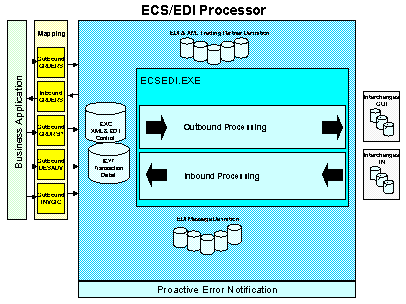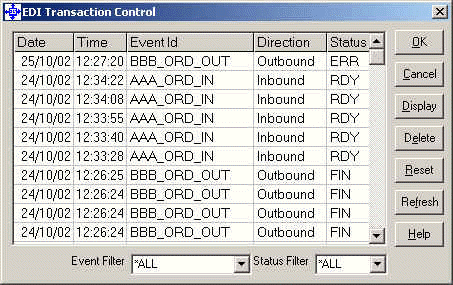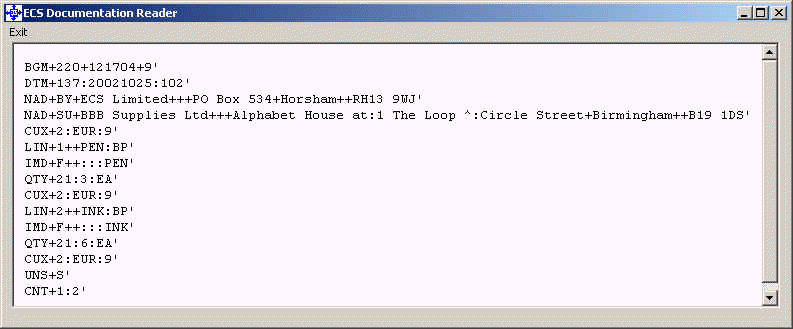
ECS/EDI Processor
EDI maximises the efficiency of exchanging business transactions, within your trading community and across enterprise boundaries. It enables the application-to-application exchange of information removing the need for human intervention.
EDI can change the way your company does business without any major re-development to the architecture of your existing business application software. To stay ahead in today's market, companies are choosing EDI because it offers speedy transactions, accurate information exchange and cost savings. EDI can help your company to manage your supply chain more effectively and supports initiatives like Just In Time (JIT) manufacturing and Efficient Consumer Response (ECR).
The ECS/EDI Processor is an extension to ECS/integrated email especially written for the IBM iSeries (AS/400) it provides seamless integration for your AS/400 Business Application to exchange EDI transactions with the outside world. The ECS/EDI Processor generates and validates EDI messages sourced from AS/400 applications. Inbound EDI messages are mapped to DB/400 files ready for posting to the AS/400 business application. The ECS/EDI Processor is event driven with proactive error notification for fully automated operation.
Implemented properly, EDI can save companies a lot of time and money in both personnel and material costs. Because incoming orders, invoices, etc. no longer have to be entered into a company's computer system manually, the labour cost of the data entry personnel is saved. Furthermore, there is no possibility of typing errors. For outgoing documents, all of the paper and paper handling costs associated with printing and mailing the documents are saved. There are costs associated with transmitting EDI documents, but these are small compared with the paper, paper handling and mailing costs.
The ECS/EDI Processor can be integrated with any AS/400 Business Application. Integration is performed by developing mapping programs to map the data from the Business Application (shown in the following diagram in Yellow). The point of application integration with the ECS/EDI Processor is the same for either Inbound or Outbound transactions, with two DB/400 physical files. (IEYT & IEXC). To aid a smooth and rapid implementation a working Sample application is supplied with programs and documented source code demonstrating how Conversion and Selection programs are built, these can be used as templates and adapted to suit your EDI and Business Application requirements .
Management of Trading Partner relationships and communications is performed using ECS/integrated email (ECS/ie). EDI Interchange files can be exchanged via email, FTP'd, published on a Web Server or transmitted via a supported Value Added Network (VAN), such as IBM Expedite.
An EDI Trading Partner Event must be defined before Inbound or Outbound transactions can be processed. The Trading Partner Event defines the definition of the transaction, for mapping, validation and communications. An administrator is assigned to each Trading Partner Event, who is automatically notified by email or paged if an error occurs.
The ECS/EDI Processor is supplied with a predefined EDI Standards database containing the UN/EDIFACT & Tradacoms Message, Segment, Element & Code List tables used for Message Validation and data conversion.
Outbound Processing
The ECS/EDI Processor requires the Transaction and Control records to have been created by an external user developed Generation program. The Generation program is closely linked to the Business Application and should be designed/developed according to the Business Application & EDI Message Agreement requirements. The ECS/EDI Processor is responsible for compiling the EDI formatted Messages, validation, consolidation, packing and handover to communications application for transmission.
Status Codes:
RDY: Data has been mapped and is Ready for EDI Message Generation
CRT: EDI Message created, ready for validation.
PIP: Pack In Progress, message generated, validated and ready to be packed
FIN: Interchange Created and placed in Output folder ready for Transmission
ERR: Error
The ECS/EDI Processor will perform the following processing, in three stages, to translate the AS/400 Business Application data to a formatted and validated EDI Interchange:
Stage (1) - Message Generation
Reads through control file selecting Outbound mapped EDI Transactions
Retrieves related Transaction records
Perform Element data cross reference
Insert required release characters into element data
Perform individual character translation for Syntax Set
Compose Segment records using Transaction Detail & message definition
Compress Segment Records to remove redundant delimiters
Generate Individual Message(s)
Stage (2) Message Validation
Segment Tag Identifier
Populated Elements
Coded Elements against related code list table
Element Minimum & Maximum lengths
Validate individual characters against Permitted Character set
Stage (3) Interchange Pack
Insert Message Envelopes
Consolidate Messages into Interchange
Insert Interchange Envelope
Generate Interchange in Output folder, ready for transmission
Update EDI Control file (IEXC)
The configuration of the EDI Trading Partner Event is performed centrally, within ECS/integrated email. The following is an example of the configuration of an Outbound EDI Trading Partner Event:
Inbound Processing
Inbound Interchanges are placed into an Input folder by the communications application, Inbound EDI Trading Partner Events are configured to scan an Input folder, which is automatically performed on each cycle of the ECS/EDI Processor. The Inbound EDI Interchange is selected, matched to a Trading Partner Event, Unpacked into individual messages, validated and finally converted to the AS/400 database ready for mapping to the Business Application.
Status Codes:
UIP: Unpack In Progress, message not yet validated
UNP: Unpacked, Validated and ready for conversion to database
RDY: Ready for Mapping to Business Application
FIN: Mapped to Business Application, Processing completed.
ERR: Error
The ECS/EDI Processor will perform the processing of Inbound EDI Interchanges, in three stages, to achieve the target of converting Inbound EDI Interchanges to AS/400 database format in preparation for mapping to the AS/400 Business Application:
Stage (1) Interchange Unpack
Read interchange header, locate related Trading Partner
Extract Messages into individual files
Read message header, locate related Trading Partner Event
Stage (2) Message Validation
Segment Tag Identifier
Populated Elements
Coded Elements against related code list table
Element Minimum & Maximum lengths
Validate individual characters against Permitted Character set
Stage (3) Message Conversion
Reads through control file selecting Outbound mapped EDI Transactions
De-Compose Segment records using Transaction Detail & message definition
Remove release characters from element data
Perform Element data cross reference
Write Transaction records containing data and element references (IEYT)
Write EDI Control Record (IEXC)
All errors encountered during Inbound and Outbound processing is proactively reported by email to the Event Administrator. Data control and Error Maintenance is performed using EDI Transaction Control.


Supported EDI Standards
EDIFACT (including subsets, such as EANCOM)
Tradacoms
Supported EDI Communications
IBM Information Exchange Value Added Network (Expedite)
File Transfer Protocol (FTP)
email attachment
email body
<<<<< Back to ECS/EDI Menu <<<<<
Copyright © 1998-2003 Electronic Commerce Solutions All rights reserved.
ECS/integrated
email & ECS/ie are trademarks of Electronic Commerce Solutions, Ltd. Other
brand names and product names used in this document are the trademarks and trade
names of their respective holders and may be registered.